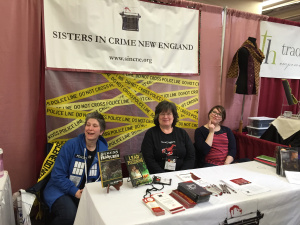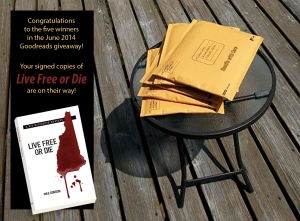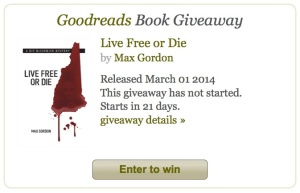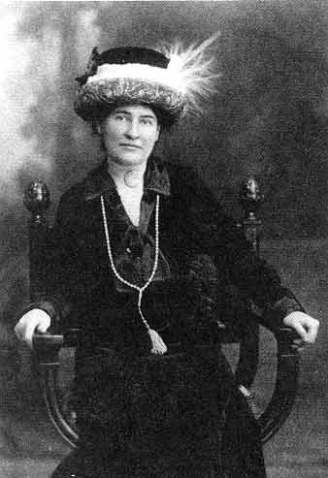Despite my best intentions to finish in time for a spring release, the second book in the Kit McCormick mystery series won’t hit the shelves (or the e-readers) until later this year. I’m hoping for an October publication date. Maybe a Halloween-themed release party?
Sisters in Crime Embraces the New Hampshire Women’s Expo
I couldn’t attend the Women’s Expo in Manchester, NH, yesterday, but a copy of Live Free or Die went in my place…to be raffled off. Thanks to the Sisters who were on the (crime) scene to pack the booth; it’s a mystery to me how you find the time…
Here’s a glimpse of the SinC New England team before the crowd flooded the Women’s Expo at the Radisson in Manchester, NH, this morning. We look organized and creative, right? Ready, set, let’s talk to everyone about SinC and the 2015 New England Crime Bake (first weekend of November, 3 days of bliss).
Trust me, after we packed twice as many authors into the booth and then were surrounded by a moving flood of hundreds of women, some with baby strollers, some taking writing classes in their 70s, some in suits, some in fab T-shirts, some with multiple piercings, some carrying roses, some carrying goodie-bags of handouts … it got a lot more interesting!
And adventurous (SincNE’s first time at this expo). And mysterious (how DID we fit that many people into the booth and all keep talking?). And delightful (want to see all the things I brought home as…
View original post 61 more words
Doe’s you’re book book Kneed aN editter? (Survey says…Yes!)
“Creativity is allowing yourself to make mistakes. Art is knowing which ones to keep.”—Scott Adams, Dilbert
Not everyone wants or needs the same level of editing. And while anyone with a good eye, impeccable spelling, and an excellent grasp of grammar and punctuation rules can copyedit a fiction manuscript, it takes an artist to polish a novel from a rough stone into a fine gem. I am that artist. Through years of practice and a natural talent, I have mastered the art of line editing, and I have a special flair for fiction.
Whether your novel needs just a few minor adjustments or a major overhaul, I can help—without changing YOUR unique voice.
A special note for self-publishers and first-time authors:
No matter how good your book may be now, you can always benefit from having an impartial, trained, intuitively talented editor help you prepare your manuscript ready for publication. I am a published author and long-time professional editor whose clients include writers whose memoirs, general nonfiction, and novels have spent time on The New York Times bestseller list.
Editing Rates—Priced according to the number of words you send me):
surface editing—Sometimes mistakenly called proofreading, this means correcting simple grammatical and spelling errors, plus adding the occasional comment or query for clarification.
• Up to 100,000 words = .01 per word
• 100,001 and over = .015 per word
copyediting—This process includes the above, plus minor sentence revision, vocabulary/tone adjustments, simple sentence or paragraph reorganization.
• Up to 100,000 words = .015 per word
• 100,001 and over = .02 per word
line/substantive editing—This includes all the above, plus major enhancements in tone, organization, and content. Warning: Prima donnas should NOT request this level of editing. These fees are estimates only until I can evaluate the actual manuscript.
• Up to 100,000 words = .02 per word
• 100,001 and over = .03–.05 per word
Other services:
• book design and formatting for self-publishing
• custom print-ready cover designs
• ask!
Email a sample and project description for an estimate. Package pricing available.
Musing About Muses
In 2007, HarperCollins published an illustrated slipcase edition by one of my favorite writers ever. The text originally appeared in The New York Times (July 16, 2001) as “Easy on the Adverbs, Exclamation Points and Especially Hooptedoodle.” The book, Elmore Leonard’s 10 Rules of Writing, stretches to just 90 pages, with illustrations, and by virtue of having been printed on 100# card stock (I’m estimating), manages to feel like a hefty tome while still being short enough that one of those hyperdexterous artists could etch it onto a grain of rice. Like Strunk and White’s slim guide to good writing, Leonard’s book is worth many times its weight. My copy (signed edition #236 of 400) holds a place of honor above my desk next to Jim White’s Clarity: A Text on Writing, a book to which I contributed years ago, and the aforementioned gem, The Elements of Style.
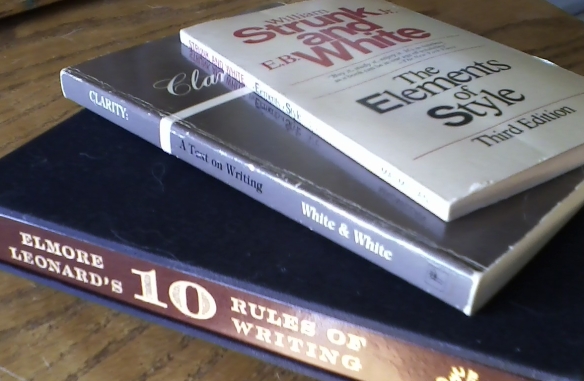 Which brings me to this. In April 2014, I released Live Free or Die, the first in a series of murder mysteries featuring amateur sleuth and professional writer Kit McCormick. I wrote the book on a lark, to cure a nasty case of writer’s block, while I was working on my “real” book, my (second or third) version of every earnest writer’s Great American Novel.
Which brings me to this. In April 2014, I released Live Free or Die, the first in a series of murder mysteries featuring amateur sleuth and professional writer Kit McCormick. I wrote the book on a lark, to cure a nasty case of writer’s block, while I was working on my “real” book, my (second or third) version of every earnest writer’s Great American Novel.
Now I am torn.
A handful of strangers and a crowd of friends and family are clamoring impatiently for Kit book #2, and while I have it somewhat sketched out, I am stalled. I know some people who can churn out page after page of bearable if unremarkable prose without breaking a sweat, but I wrestle with every detail, adjusting the characters’ collars and connecting the strands from plot points A to Z…and it’s slow going. So every once in a while I glance up at the trio of books by the Masters and think…this is why I have spent all my life tasting words and dreaming dialogues? For one or two or five whodunits that only a few hundred people will ever see? I imagine my mentors (some big names, and all big talents) scowling at me for abandoning my “art.” I am not a fan of adverbs or exclamation points…but am I too enamored of hooptedoodle?
Books, Music, and Hangin’ Out at Home
Reason #1 for this post:
My favorite musician, Elizabeth Lorrey, has something of a reputation. It seems that just the act of her scheduling a gig to play out is enough to cause some major weather event. Seriously…I know people who check her tour schedule before they plan any outdoor functions, since if she’s on stage, there’s bound to be a blizzard or a tornado on the way. With the safety and comfort of her audience in mind, Elizabeth and her good friends The Rafters are teaming up for a special series of shows called the “Shelter in Place” Tour.
What this means is that you can put on your comfy clothes, set out your favorite nibbles and beverages, and listen to great music from the comfort of your own home (or a friend’s Shelter in Place party), by logging onto Concert Window (concertwindow.com) at the scheduled times to hear them streaming live from a weather-free bunker in an undisclosed location. The gigs are scheduled for the days that most folks want to stay home anyway, with the first one being…you guessed it…Black Friday!
8pm, November 28, concertwindow.com
Reason #2 for this post:
Which brings me to the REAL reason for this post. For the days leading up to Black Friday, I’m going to share a giveaway with you. I’ve teamed up with The Kindle Book Review, Digital Book Today, and some amazing authors to sponsor a Black Friday Giveaway. Join me and you can win a $400 Amazon Shopping Spree! Just click on the link to enter. It’s easy, fun, and the prize is awesome! You don’t even have to read my book…but I hope you do.
By the way, I’ll be giving away a signed copy of Live Free or Die (just in time to give as a gift for the holidays) during the Black Friday gig, but you have to be tuned in to win, because you’ll have to type something into the comments to enter. 
The Latest Review of Live Free or Die
Fellow author and Sisters In Crime member Maryann Miller reviews Live Free or Die: http://its-not-all-gravy.blogspot.com/2014/08/book-review-live-free-or-die-by-max.html
You’ve got mail!
Recently, 434 Goodreads members entered a giveaway for a signed copy of Live Free or Die, the first in a planned series featuring Kit McCormick. Congratulations to the five lucky winners: Robert Dunn, Amy Kartman, Wheeler Cowperthwaite, Joel Luzmoor, and Kat Bryant!
Win a free signed copy of Live Free or Die: Giveaway starts today!
Be one of five lucky winners to have a free SIGNED print copy of Live Free or Die mailed right to your door! To enter, go to Max Gordon’s Goodreads Giveaway between May 30 and June 30. Good luck!
When travel writer Katherine “Kit” McCormick honestly reviews her life, she can give it just three stars out of five, until a freak accident catapults her out of her lethargy and into the middle of a grisly murder case: a loathsome real estate mogul turns up dead in her office. As the ex-lover of the dead man’s wife, Kit makes the shortlist of suspects—and becomes the killer’s next target. Kit finds herself drawn deeper into the intrigue, and toward Detective Kasey Chakarian. Together they unravel the complicated knot of corruption, illicit liaisons, and shameful secrets, but every clue leads to further entanglements—and traps Kit in the killer’s deadly web.
Amazon v Hachette: Don’t Believe The Spin
Amazon isn’t the bully this time.
Great Writers: Willa Cather
A quick study on Willa Cather’s multilayered style for a writer I was mentoring:
You don’t need endless modifiers to draw a believable character, but a well placed adjective or adjective, combined with telling detail, can sometimes do double duty, both setting the stage and establishing the actors. Here are two random passages (the first from near the beginning and the second from closer to the end) of a Willa Cather short story. The first, though as formal in style as the one that follows, is rather more spare than the second, in which modifiers are layered one atop another as the daughter-in-law struggles to determine what it is about Rosicky that makes him so different from other farmers—other people—that she has known:
1. With Mary, to feed creatures was a natural expression of affection,—her chickens, the calves, her big hungry boys. It was a rare pleasure to feed a young man whom she seldom saw and of whom she was as proud as if he belonged to her. Some country housekeepers would have stopped to spread a white cloth over the oilcloth, to change the thick cups and plates for their best china, and the wooden-handled knives for plated ones. But not Mary.
“You must take us as you find us, Doctor Ed. I’d be glad to put out my good things for you if you was expected, but I’m glad to get you any way at all.”
He knew she was glad,—she threw back her head and spoke out as if she were announcing him to the whole prairie. Rosicky hadn’t said anything at all; he merely smiled his twinkling smile, put some more coal on the fire, and went into his own room to pour the Doctor a little drink in a medicine glass. When they were all seated, he watched his wife’s face from his end of the table and spoke to her in Czech. Then, with the instinct of politeness which seldom failed him, he turned to the Doctor and said slyly: “I was just tellin’ her not to ask you no question about Mrs. Marshall until you eat some breakfast. My wife, she’s terrible fur to ask questions.”
2. “I like mighty well to see dat little child, Polly,” was all he said. Then he closed his eyes and lay half-smiling. But Polly sat still, thinking hard. She had a sudden feeling that nobody in the world, not her mother, not Rudolph, or anyone, really loved her as much as old Rosicky did. It perplexed her. She sat frowning and trying to puzzle it out. It was as if Rosicky had a special gift for loving people, something that was like an ear for music or an eye for colour. It was quiet, unobtrusive; it was merely there. You saw it in his eyes, —perhaps that was why they were merry. You felt it in his hands, too. After he dropped off to sleep, she sat holding his warm, broad, flexible brown hand. She had never seen another one in the least like it. She wondered if it wasn’t a kind of gypsy hand, it was so alive and quick and light in its communications,—very strange in a farmer. Nearly all the farmers she knew had huge lumps of fists, like mauls, or they were knotty and bony and uncomfortable-looking, with stiff fingers. But Rosicky’s was quicksilver, flexible, muscular, about the color of a pale cigar, with deep, deep creases across the palm. It wasn’t nervous, it wasn’t a stupid lump; it was a warm brown human hand, with some cleverness in it, a good deal of generosity, and something else which Polly could only call “gypsy-like,”—something nimble and lively and sure, in the way that animals are.
—“Neighbor Rosicky,” Willa Cather
The first passage is deceptively simple—no fancy words, no poetic metaphors, no drawn-out belaboring of metaphors to describe the scene. But I say deceptive because that’s exactly the “trick” Cather is using, if you want to call it that. Her words and sentences are simple, straightforward, and as plain as Mary’s everyday tableware…because that is the Rosicky household stripped to its essence. The point of view is omniscient (typical of the times; this was published in 1932), though you are barely aware of the fact as you are reading it as it all seems very natural because Cather doesn’t stay inside any one character’s head for long; what she does is more like eavesdropping, or peeking around corners. Anything else would weigh down the story and complicate the sense that these are what many of us rural folks call “good people,” two bland words that nevertheless carry reams of nuanced meaning.
The second passage has an entirely different feel, yet you can still feel Cather’s deft touch with the language, again choosing everyday words and images (after all, she is still describing the same family—in this case, the eponymous main character), but stringing them together in an entirely different way. But again, the simplicity is deceptive. If you compare the cadence of this passage to that of the first, you get a different feel altogether. The first passage is matter-of-fact, homespun, declarative sentences. Cather balances long sentences with short ones, but none of them are particularly intricate or complex. There’s a certain rough poetry in her choice of details (the oilskin everyday tablecloth, the liquor in a medicine glass, big hungry boys lumped together with chickens, calves, and other “creatures”), but the narrator (Cather) is saying, it is what it is. The second passage, though, is packed with poetic imagery, metaphors, and speculation. Whereas the first passage places us in a country kitchen with farmer folk and the local doctor, the second on thrusts us into someone’s head (Polly, the daughter-in-law) and keeps us there while she flounders for just the right word, the right metaphor, the essence of Rosicky. She picks one, then another, stringing them together not just with commas but with ands (“alive and quick and light in its communications”…“nimble and lively and sure, in the way that animals are”) because when you’re groping for just the right word, that’s how they sift up: one, then another, then another…. The pace of the ever-changing imagery flings us headlong forward in a way that the casual pace of the first passage did not, which makes sense given what happens next.
Ostensibly Polly is talking about Rosicky’s hand, but in reality she is struggling to decide what Rosicky himself is all about. The next lines after that paragraph tell us that Cather isn’t just blathering on about hands for no reason: “Polly remembered that hour long afterwards; it had been like an awakening to her. It seemed to her that she had never learned so much about life from anything as from old Rosicky’s hand. It brought her to herself; it communicated some direct and untranslatable message.” He dies, of course, soon after. But because we have learned so much about him and his family, we know that these are not people who will be beaten down by grief and loss (as some others are in the story) but who will be grateful to have known him and for learning from him how to live well (“I’d rather put some colour into my children’s faces than put money in the bank,” Mary says earlier). It all foreshadows the final scene where the Doctor heads out to the farm a few weeks after Rosicky has died, but stops before he gets there by the “beautiful” graveyard that the farmer himself first described earlier on. The Doctor compares the “arranged and lonely” graveyards of the city with this place that is open and free, with neighbors passing by, and Rosicky’s own cattle grazing in a nearby field. The last lines: “Nothing could be more undeathlike than this place; nothing could be more right for a man who had helped to do the work of great cities and had always longed for the open country and had got to it at last. Rosicky’s life seemed to him complete and beautiful.”
That’s a lot of people and place packed into two passages.


